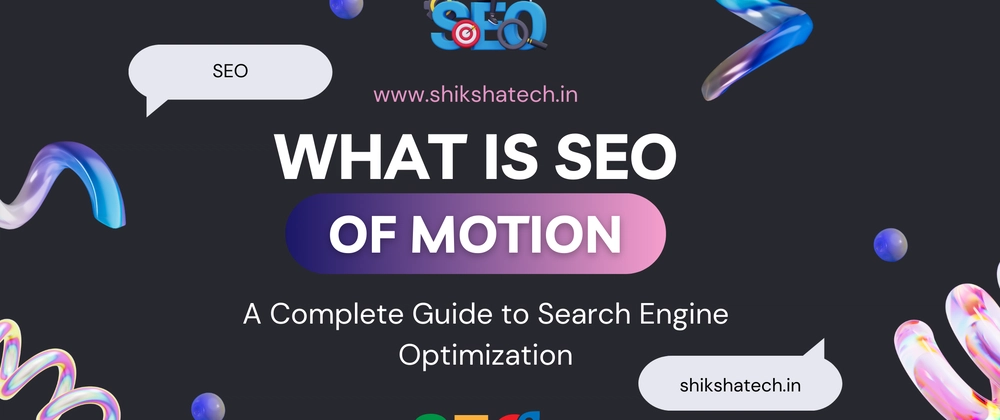Search Engine Optimization (SEO) is the process of enhancing a website’s visibility on search engines like Google, Bing, and Yahoo to drive organic (unpaid) traffic. It involves optimizing content, website structure, and off-page factors to improve rankings in search engine results pages (SERPs).
In simple terms, SEO helps websites rank higher so that users can easily find them. If you run a business, blog, or eCommerce store, SEO is crucial to attract visitors and grow online presence.
Importance of SEO in Digital Marketing
SEO is the backbone of digital marketing. It helps businesses:
✅ Increase Organic Traffic: Better rankings lead to more clicks.
✅ Improve Brand Awareness: A top-ranked website gains trust.
✅ Boost Conversions & Sales: Higher visibility means more customers.
✅ Reduce Paid Advertising Costs: Good SEO brings free traffic.
✅ Stay Competitive: Outranking competitors means better business growth.
Without SEO, even well-designed websites struggle to attract visitors.
How SEO Works
Search engines use complex algorithms to determine how to rank pages. SEO involves optimizing different factors to align with these algorithms.
The ranking process includes:
Crawling: Search engines discover new content using bots.
Indexing: The discovered pages are stored in a database.
Ranking: Google ranks pages based on relevance, authority, and user experience.
Google updates its ranking algorithms regularly (e.g., Panda, Penguin, and BERT), so SEO strategies must evolve accordingly.
How Search Engines Work
Search engines follow three key processes:
1️⃣ Crawling: Bots scan the internet to discover new pages.
2️⃣ Indexing: Discovered pages are stored in the search engine database.
3️⃣ Ranking: Algorithms rank pages based on relevance and authority.
Understanding Google Algorithm Updates is key to staying ahead in SEO.
Keyword Research and Its Importance
How to Find the Right Keywords?
✅ Use tools like Google Keyword Planner, Ahrefs, SEMrush.
✅ Find low-competition, high-search-volume keywords.
✅ Identify long-tail keywords (e.g., “best SEO strategies for small businesses”).
On-Page SEO Strategies
🔹 Internal Linking: Connect pages for better navigation.
🔹 Image Optimization: Use alt text for accessibility and rankings.
🔹 Header Tags (H1-H6): Improve content readability.
Example: Articles with structured headings and internal links rank higher.
Off-Page SEO Techniques
🔹 Building High-Quality Backlinks from reputable sites.
🔹 Social Signals (shares, likes, comments) boost rankings.
🔹 Guest Blogging & Forum Participation improve credibility.
Example: Backlinks from authoritative websites like Moz or HubSpot increase domain authority.
Technical SEO Best Practices
🔹 Site Speed: Optimize loading time.
🔹 Fix Broken Links: Avoid 404 errors.
🔹 Structured Data (Schema Markup): Helps search engines understand content.
Example: Websites with structured data get rich snippets in Google search results.
SEO Tools and Resources
✅ Google Analytics & Google Search Console
✅ Ahrefs, SEMrush, Moz
✅ Free vs. Paid SEO Tools
These tools help track rankings, analyze competitors, and optimize SEO strategies.
SEO Myths and Misconceptions
❌ SEO is Dead – Google still prioritizes organic search.
❌ More Keywords = Better Rankings – Keyword stuffing hurts SEO.
❌ Paid Ads Boost Organic Rankings – Paid ads don’t impact organic results.
Measuring SEO Success
🔹 Track Key Metrics: Organic traffic, bounce rate, rankings.
🔹 Use Google Search Console to monitor SEO health.
🔹 Conversion Rate Optimization (CRO): Optimize for sales and leads.
Advanced SEO Strategies
🚀 AI in SEO – Google uses AI for search intent.
🎤 Voice Search Optimization – “Hey Google, find SEO tips.”
📹 Video SEO – YouTube SEO increases visibility.
📱 Mobile-First Indexing – Google prioritizes mobile-friendly sites.
Future of SEO
🔮 AI & Machine Learning in Search
🔮 Zero-Click Searches (Google answers without clicking links)
🔮 Evolving User Intent & Search Behavior



Top comments (0)